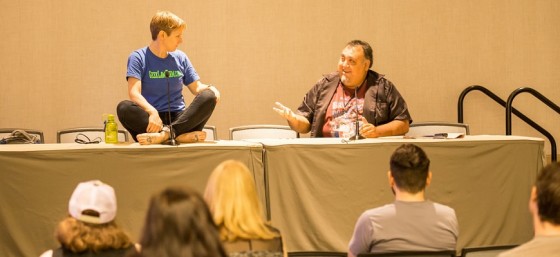
I had an awesome time presenting on Creator Rights at Phoenix Comicon this year with Javier Hernandez. His comic book series, El Muerto, was recently made into a movie and a fan created a fan film that was shown at the Con. It was really interesting to hear his story as an artist trying to muddle through the legalities of working in the arts with the help of his lawyer.
I don’t prepare much for my talks at Phoenix Comicon. I feel like it’s my job to be there to explain legal concepts in plain English and answer the audience’s questions about copyright, trademarks, contracts, and fan art. There’s always a fun smart audience with thoughtful questions. It’s a privilege to be invited back multiple times. Here are some of the highlights from this year.
You have Rights in your Original Creations
There is no legal protection for ideas but there is for original works of authorship once you’ve captured your ideas in a tangible medium such as paper or a digital file. The copyright laws were designed to protect original story lines and fully-formulated characters. I often recommend that artists at least register their “story bible” with the U.S. Copyright Office to maximize their legal rights related to their work.
Once you create a comic, you have the exclusive right to copy, distribute, display, perform, or make derivative works from your original work. That’s why the movie studio had to get the option (aka license) from Javier to make a movie from El Muerto, because a movie is a derivative work. Javier didn’t authorize the creation of the fan film and so when he went to see it, part of his motivation was to see if he wanted to exert his legal rights to stop the creators from showing it in other forums.
Protect your Trademarks
Someone in the audience shared a horrific story. He created a comic and after he started sharing his work with others, someone else started a similar comic – with the same name. Here’s the kicker, the second guy registered the name with the U.S. Patent and Trademark Office. What a nightmare. I told him to call a lawyer to try to sort out this mess.
A lot of beginning artists and people who create art as a hobby don’t understand their rights and how they can avoid problems like this by registering their trademark before their competition does. Or if they understand their rights, they don’t invest the money to file the proper applications with the federal government. These types of problems happen all the time. Check out what happened when two restaurants decided to call themselves “Burger King.”
When Contracts are Involved, Call a Lawyer
If you are lucky enough to create art that someone wants to buy or license, call a lawyer. The other side is going to present you with a contract that was written solely based on their interests. You need someone who is equally versed in entertainment contracts to represent you. Lawyers talk to lawyers – so hire someone who can explain the process, understand your priorities, and advise you of your options.
Javier and I had a fantastic time doing this panel – sharing our experiences and knowledge from the creator’s and lawyer’s perspective. It was a wonderful juxtaposition for the audience. I also did a panel at Phoenix Comicon on Fan Art/Fiction and Copyright. If you want to know more about that specific topic, check out this post I wrote last year with a handy mnemonic device.
If you have questions or want to chat more about creator rights, please contact me directly or connect with me on social media via Twitter, Facebook, YouTube, or LinkedIn.